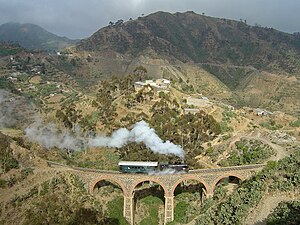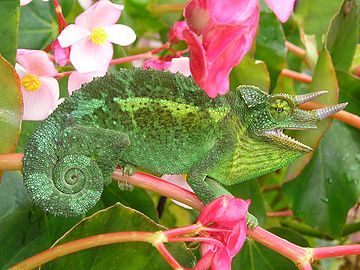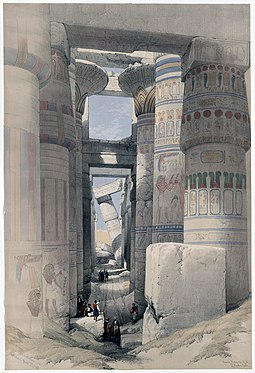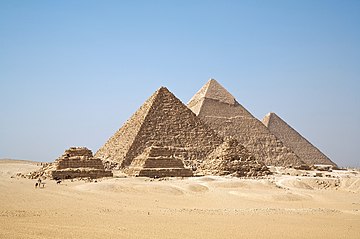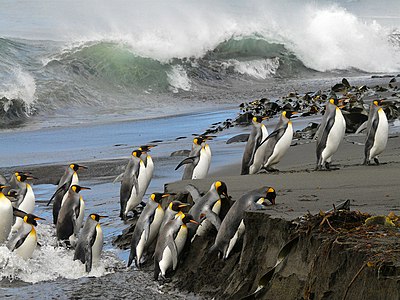Portal:Africa



Africa is the world's second-largest and second-most populous continent after Asia. At about 30.3 million km2 (11.7 million square miles) including adjacent islands, it covers 20% of Earth's land area and 6% of its total surface area. With 1.4 billion people0 as of 2021, it accounts for about 18% of the world's human population. Africa's population is the youngest amongst all the continents; the median age in 2012 was 19.7, when the worldwide median age was 30.4. Despite a wide range of natural resources, Africa is the least wealthy continent per capita and second-least wealthy by total wealth, ahead of Oceania. Scholars have attributed this to different factors including geography, climate, corruption, colonialism, the Cold War, and neocolonialism. Despite this low concentration of wealth, recent economic expansion and the large and young population make Africa an important economic market in the broader global context. Africa has a large quantity of natural resources and food resources, including diamonds, sugar, salt, gold, iron, cobalt, uranium, copper, bauxite, silver, petroleum, natural gas and cocoa beans, and tropical fruit.
Africa straddles the equator and the prime meridian. It is the only continent to stretch from the northern temperate to the southern temperate zones. The majority of the continent and its countries are in the Northern Hemisphere, with a substantial portion and a number of countries in the Southern Hemisphere. Most of the continent lies in the tropics, except for a large part of Western Sahara, Algeria, Libya and Egypt, the northern tip of Mauritania, and the entire territories of Morocco, Ceuta, Melilla, and Tunisia which in turn are located above the tropic of Cancer, in the northern temperate zone. In the other extreme of the continent, southern Namibia, southern Botswana, great parts of South Africa, the entire territories of Lesotho and Eswatini and the southern tips of Mozambique and Madagascar are located below the tropic of Capricorn, in the southern temperate zone.
Africa is highly biodiverse; it is the continent with the largest number of megafauna species, as it was least affected by the extinction of the Pleistocene megafauna. However, Africa also is heavily affected by a wide range of environmental issues, including desertification, deforestation, water scarcity, and pollution. These entrenched environmental concerns are expected to worsen as climate change impacts Africa. The UN Intergovernmental Panel on Climate Change has identified Africa as the continent most vulnerable to climate change.
The history of Africa is long, complex, and varied, and has often been under-appreciated by the global historical community. Africa, particularly Eastern Africa, is widely accepted to be the place of origin of humans and the Hominidae clade, also known as the great apes. The earliest hominids and their ancestors have been dated to around 7 million years ago, including Sahelanthropus, Australopithecus africanus, A. afarensis, Homo erectus, H. habilis and H. ergaster, the earliest Homo sapiens (modern human) remains, found in Ethiopia, South Africa, and Morocco, date to circa 233,000, 259,000, and 300,000 years ago, respectively, and Homo sapiens is believed to have originated in Africa around 350,000–260,000 years ago. Africa is also considered by anthropologists to be the most genetically diverse continent as a result of being the longest inhabited. (Full article...)
Selected article –

The Victoria Falls Conference took place on 26 August 1975 aboard a South African Railways train halfway across the Victoria Falls Bridge on the border between the unrecognised state of Rhodesia (today Zimbabwe) and Zambia. It was the culmination of the "détente" policy introduced and championed by B. J. Vorster, the Prime Minister of South Africa, which was then under apartheid and was attempting to improve its relations with the Frontline States to Rhodesia's north, west and east by helping to produce a settlement in Rhodesia. The participants in the conference were a delegation led by the Rhodesian Prime Minister Ian Smith on behalf of his government, and a nationalist delegation attending under the banner of Abel Muzorewa's African National Council (UANC), which for this conference also incorporated delegates from the Zimbabwe African National Union (ZANU), the Zimbabwe African People's Union (ZAPU) and the Front for the Liberation of Zimbabwe (FROLIZI). Vorster and the Zambian President Kenneth Kaunda acted as mediators in the conference, which was held on the border in an attempt to provide a venue both sides would accept as neutral.
The conference failed to produce a settlement, breaking up on the same day it began with each side blaming the other for its unsuccessful outcome. Smith believed the nationalists were being unreasonable by requesting preconditions for talks—which they had previously agreed not to do—and asking for diplomatic immunity for their leaders and fighters. The nationalists contended that Smith was being deliberately intransigent and that they did not believe he was sincere in seeking an agreement if he was so adamant about not giving diplomatic immunity. Direct talks between the government and the Zimbabwe African People's Union followed in December 1975, but these also failed to produce any significant progress. The Victoria Falls Conference, the détente initiative and the associated ceasefire, though unsuccessful, did affect the course of the Rhodesian Bush War, as they gave the nationalist guerrillas significant time to regroup and reorganise themselves following the decisive security force counter-campaign of 1973–74. A further conference would follow in the Geneva Conference in 1976 . (Full article...)Featured pictures –
Did you know (auto-generated) -

- ... that in the 1880s Joseph T. Wilson wrote the "most comprehensive study of African American military service" of the era?
- ... that Mackay Davashe wrote "Lakutshona Ilanga", the English version of which, sung by Miriam Makeba, became the first South African piece to chart on the Billboard Hot 100?
- ... that police in Indianola, Mississippi, shot an unarmed 11-year-old African-American boy after responding to his 9-1-1 call for help at his home?
- ... that in 1888, Edward P. Duplex became the first African American to be elected a mayor in California?
- ... that after Benjamin Moloise's execution, the extremist group Direct Action bombed two Paris companies linked to South Africa in protest?
- ... that during the First World War the East African Mounted Rifles sometimes painted stripes on their horses to camouflage them as zebras?
Categories
Selected biography –
Rémy Mwamba (1921–1967) was a Congolese politician who twice served as Minister of Justice of the Democratic Republic of the Congo (then Republic of the Congo). He was also a leading figure of the Association Générale des Baluba du Katanga (BALUBAKAT).
Mwamba was born in 1921 in Vunga, Belgian Congo to a Luba family. After completing his education he took up work at the Élisabethville Parquet. He later co-founded and became secretary-general of BALUBAKAT. He served in the Collége Exécutive Général transitional government before being elected a senator of the newly independent Republic of the Congo in 1960. Mwamba was subsequently appointed to serve as Minister of Justice in the first government under Prime Minister Patrice Lumumba. On 5 September he and Lumumba were dismissed by the President. Following harassment by the new authorities, Mwamba fled to Stanleyville and joined a rival regime. Negotiations led to the creation of a new government in August 1961 under Cyrille Adoula and he resumed his work as Minister of Justice. Following his dismissal in July 1962, Mwamba joined the parliamentary opposition. He died in 1967. (Full article...)Selected country –
 |
 |
|

| ||
The Comoros (Arabic: جزر القمر, Ğuzur al-Qamar), officially the Union of the Comoros (French: 'Union des Comores', Arabic: الإتّحاد القمريّ, Al-Ittiḥād al-Qamariyy) is an island nation in the Indian Ocean, located off the eastern coast of Africa on the northern end of the Mozambique Channel between northern Madagascar and northeastern Mozambique. Prior to 2002, it was known officially as the Islamic Federal Republic of the Comoros. At 2,235 km² and with a population estimated at 798,000, the Comoros is the third smallest African nation by area and the sixth smallest by population.
The country officially consists of the four islands in the volcanic Comoros archipelago: Ngazidja (French: Grande Comore), Mwali (French: Mohéli), Nzwani (French: Anjouan), and Mahoré (French: Mayotte), as well as many smaller islands. However, the government of the Union of the Comoros (or its predecessors since independence) has never administered the island of Mayotte, which France considers an overseas community and still administers. (Read more...)
Selected city –
Cotonou (French pronunciation: [kɔtɔnu]; Fon: Kútɔ̀nú) is the largest city in Benin. Its official population count was 679,012 inhabitants in 2012; however, over two million people live in the larger urban area.
The urban area continues to expand, notably toward the west. The city lies in the southeast of the country, between the Atlantic Ocean and Lake Nokoué. (Full article...)In the news
- 12 February 2024 –
- Two boats collide on the Congo River near Kinshasa, Democratic Republic of the Congo; with the death toll remains unclear. (AP)
- 11 February 2024 – 2023 Africa Cup of Nations
- In association football, hosts Ivory Coast win their third Africa Cup of Nations by defeating Nigeria 2–1 in the final. Sébastien Haller scores the winning goal in the 81st minute. (The Guardian)
- 10 February 2024 – Somali civil war
- Four Emirati soldiers and a Bahraini military officer are killed, while ten other people are injured, when a soldier opens fire at a military base in Mogadishu, Somalia, before being killed in the ensuing shootout. Al-Shabaab claims responsibility. (AP)
- 10 February 2024 –
- A Eurocopter EC130 helicopter crashes near Nipton, California, United States, killing all the six people on board, including Nigerian banker Herbert Wigwe. (CBS News)
- 10 February 2024 – 2023–2024 Senegalese protests
- Violent protests occur in Senegal following an announcement by President Macky Sall that presidential elections have been delayed from February 25 to December 15. (Sky News)
- 9 February 2024 –
- At least 18 people are killed during a collision between a bus and a truck on a road in Kinshasa, Democratic Republic of the Congo. (AP)
Updated: 16:33, 14 February 2024
General images -
Africa topics
More did you know –
- ... that Liberia College in the country of Liberia was authorized by the legislature in 1851, but did not start classes until 1863?
- ... that the forced removal of 700,000 people from slums in Zimbabwe in 2005 was called "a crime against humanity" by the UN?
- ... that the supreme god of the southern African Bushmen is Cagn, a trickster who shapeshifts into a praying mantis?
- ... that Bahá'í Faith in Niger began during a period of wide scale growth in the religion across Sub-Saharan Africa near the end of its colonial period?
Related portals
Major Religions in Africa
North Africa
West Africa
Central Africa
East Africa
Southern Africa
Associated Wikimedia
The following Wikimedia Foundation sister projects provide more on this subject:
-
Commons
Free media repository -
Wikibooks
Free textbooks and manuals -
Wikidata
Free knowledge base -
Wikinews
Free-content news -
Wikiquote
Collection of quotations -
Wikisource
Free-content library -
Wikispecies
Directory of species -
Wikiversity
Free learning tools -
Wikivoyage
Free travel guide -
Wiktionary
Dictionary and thesaurus
More portals
- Portals with triaged subpages from April 2019
- All portals with triaged subpages
- All portals
- Portals with no named maintainer
- Random portal component with over 50 available subpages
- Pages with French IPA
- Random portal component with 6–10 available subpages
- Africa
- Africa portal
- African portals
- Portals by continent
- Unredirected portals with existing subpages
- WikiProject Africa


